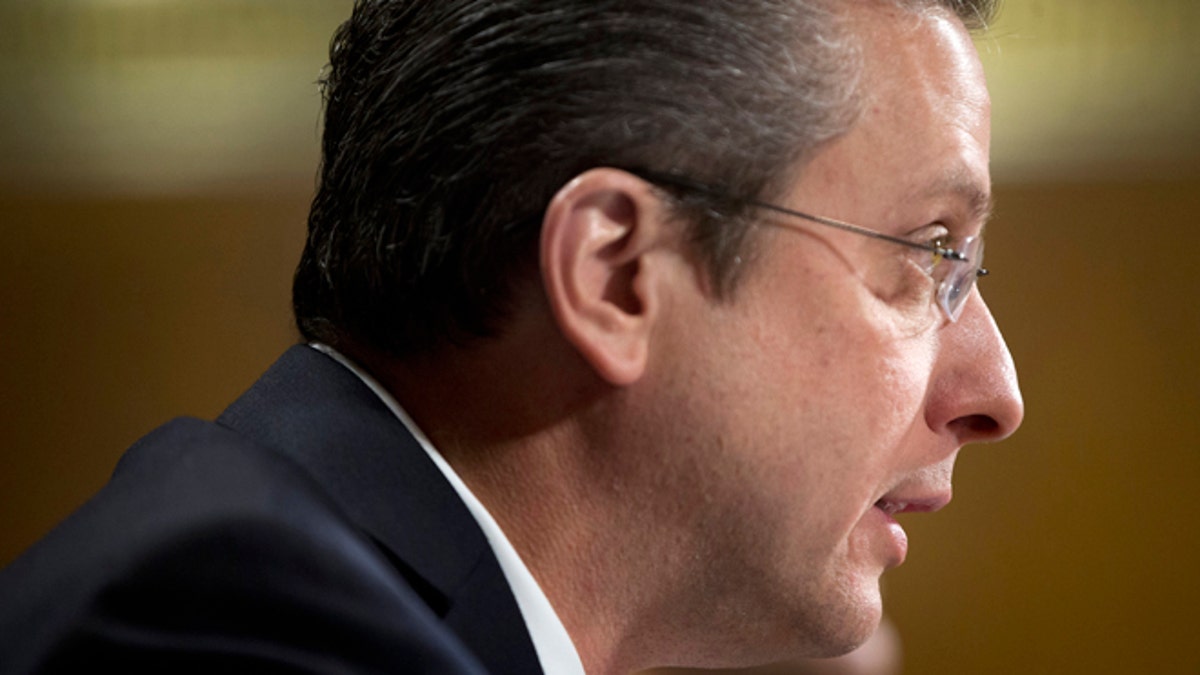
FILE - In this Dec. 1, 2015 file photo, Puerto Rico Gov. Alejandro Javier Garcia Padilla testifies on Capitol Hill in Washington before the Senate Judiciary Committee hearing on Puerto Rico's fiscal problems. On Wednesday, Dec. 30, 2015, Padilla said the U.S. territory will make a bond payment due the next week but default on the interest. The island is struggling with billions in public debt that Garcia has said is unpayable and needs restructuring. (AP Photo/Pablo Martinez Monsivais, File)
Puerto Rico is paying out nearly $1 billion in debt on Monday, keeping most, but not all, of its bond repayment commitments.
One of investors’ greatest concerns had been the U.S. territory’s general obligation bonds, which have strong legal protections and which account for nearly $330 million of the amount that was due on Jan. 1. The portions of its debt that it will fail to pay are $35.9 million in interest to the Puerto Rico Infrastructure Financing Authority, or Prifa, and $1.4 million on Public Finance Corp. bonds.
“Puerto Rico opted for a default that would send a message about the need for Chapter 9 and the potential for a humanitarian crisis on the island without triggering a wave of litigation,” Mark Palmer, who analyzes Puerto Rico and municipal bond insurers at the BTIG brokerage firm, wrote in a report on Monday, according to Bloomberg News.
Palmer sees it as a new pattern for the island’s government.
“Puerto Rico announces the least impactful default possible,” he told the Wall Street Journal, “that doesn't involve constitutionally protected debt, then uses that as a platform to lobby Congress.”
The island’s general obligation bonds rallied as a result of the payment announcement, trading at their highest levels since early December, Bloomberg reported.
This is the second time in the last five months that the island defaulted on a debt repayment, however, and several analysts told the Journal that Puerto Rico’s ongoing defaults may spark lawsuits as early as this week.
The government of Gov. Alejandro García Padilla is able to pay the nearly $1 billion in debt obligations by redirecting money from government agencies and services as well as tax money from one set of bonds to another.
Matt Fabian, partner at Municipal Market Analytics, told the Journal that that sort of shuffling opens Puerto Rico to lawsuits from the insurers or investors. “People who don’t get paid sue,” he said.
Prifa bonds are backed by a tax on rum, and bond insurers Ambac Financial Group and Financial Guaranty Insurance, which together guarantee about $860 million in Prifa bonds, last week demanded a halt to the shift in funds in a letter to the governor.
The island’s latest default, experts say, may provide incentive for the U.S. Congress to work out legislation that would allow Puerto Rico to restructure its debt more easily.
Puerto Rico is struggling with a decade-long recession and an untenable debt load of around $70 billion. On top of that, its tax base is narrowing thanks to a decline in population, primarily of people of working age.
According to Reuters, the island owes about $400 million due on Feb. 1, mostly to Puerto Rico Sales Tax Financing Corporation. That money is already being held in reserve, García Padilla has said.
David Tawil, cofounder of Maglan Capital hedge fund, told Reuters that a default of the island’s general obligation bonds is “probably inevitable” unless either Congress takes action or a settlement is reached with creditors.
According to Bloomberg, the island faces another $432 million repayment in May, and its largest payment is scheduled for July, with nearly $2 billion in interest and general obligation bonds that are maturing coming due.








































